
Bouldering is a form of free climbing that is performed on small rock formations or artificial rock walls without the use of ropes or harnesses. While bouldering can be done without any equipment, most climbers use climbing shoes to help secure footholds, chalk to keep their hands dry and to provide a firmer grip, and bouldering mats to prevent injuries from falls. Unlike free solo climbing, which is also performed without ropes, bouldering problems are usually less than six metres (20 ft) tall. Traverses, which are a form of boulder problem, require the climber to climb horizontally from one end to another. Artificial climbing walls allow boulderers to climb indoors in areas without natural boulders. In addition, bouldering competitions take place in both indoor and outdoor settings.

Glossary of climbing terms relates to rock climbing, mountaineering, and to ice climbing.
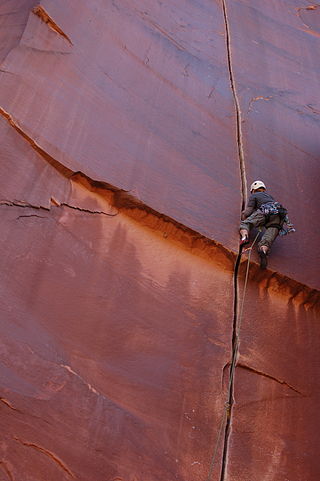
Rock climbing is a sport in which participants climb up, across, or down natural rock formations. The goal is to reach the summit of a formation or the endpoint of a usually pre-defined route without falling. Rock climbing is a physically and mentally demanding sport, one that often tests a climber's strength, endurance, agility and balance along with mental control. Knowledge of proper climbing techniques and the use of specialized climbing equipment is crucial for the safe completion of routes.

Hueco Tanks is an area of low mountains and historic site in El Paso County, Texas, in the United States. It is located in a high-altitude desert basin between the Franklin Mountains to the west and the Hueco Mountains to the east. Hueco is a Spanish word meaning hollows and refers to the many water-holding depressions in the boulders and rock faces throughout the region. Due to the unique concentration of historic artifacts, plants and wildlife, the site is under protection of Texas law; it is a crime to remove, alter, or destroy them.
Lisa Rands is an American rock climber. She is known for her bouldering for which in 2002, she became the first American female to win IFSC World Cup bouldering competitions, and topped the IFSC world boulder rankings in 2002. Rands was the first American female to climb boulders of grade V11 (8A), and V12 (8A+), and was the second-ever female in history to climb a 7C+/8A boulder. As well as making first female ascents (FFAs) of boulders such as The Mandala V12 (8A+), Rands was the first female in history to do an E8-graded traditional climbing route, The End of the Affair.

Competition climbing is a type of rock climbing held indoors on purpose-built artificial climbing walls, although earlier versions were held on external natural rock surfaces. The three standalone competition climbing disciplines are: lead climbing, bouldering, and speed climbing. A fourth discipline of "combined" is based on combinations of results in the three main disciplines. Competition climbing is sometimes called "sport climbing", which is the type of lead climbing performed in competition climbing.
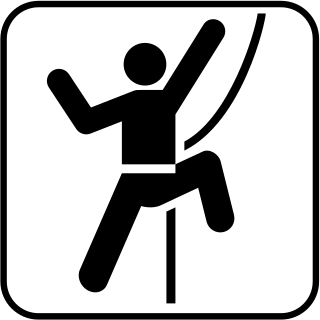
A route setter is a person who designs artificial rock climbing wall routes, or problems. Also known as "setters", these professionals combine technical craft with an artistic representation of real rock climbing moves. They do this with modular resin, polyurethane, polyester, fiberglass, or wood holds or "grips" that mimic real rock features. These routes are used by a rock climber to get to the top of a climbing wall.
In the sport of bouldering, problems are assigned technical grades according to several established systems, which are often distinct from those used in roped climbing. Bouldering grade systems vary widely in use and include the Hueco "V" grades, Fontainebleau technical grades, route colors, Peak District grades, and British technical grades. Historically, the three-level "B" system and even the Yosemite Decimal System were also used.

Sean McColl is a professional rock climber from North Vancouver, Canada. He competes in the lead climbing, speed climbing, and bouldering disciplines, and has won major competitions in all three.
Paul David Robinson is an American professional rock climber who specializes in bouldering. He has established and repeated several bouldering problems at the V15 difficulty rating, in such areas as Hueco Tanks, the Buttermilks, and Magic Wood. In 2007, Robinson became the second climber in history to successfully climb a V13 boulder problem in one attempt.
Darlene Thomasina Pidgeon is a Canadian rock climber known for being one of the world's strongest female boulderers in the early 2000s and 2010s, was for a time the strongest female Canadian boulderer, and was the first Canadian female to climb the grades of V10, V11, and V12. She is often featured in Gripped Magazine and contributes to The Collective. She has also been featured in several international magazines and websites and her image has been used in advertising, magazine galleries, and magazine covers.
USA Climbing is the national governing body of the sport of competition climbing in the United States. As a 501(c)3 non-profit, they promote Sport Climbing which comprises three competition disciplines: bouldering, lead climbing, and speed climbing, in elite, youth and collegiate formats.

Alex Puccio is a professional climber specializing in bouldering. She competes in climbing competitions and split her time between climbing outdoor and indoor. She finished third overall in the 2011 and 2013 World Cup bouldering competition, second overall in the 2014 Climbing World Championship bouldering competition, and has won the American Bouldering Series eleven times.

Ashima Shiraishi is an American rock climber. Shiraishi started climbing at the age of six at Rat Rock in Central Park, joining her father. Only a few years later, she quickly established herself as one of the top boulderers and sport climbers in the world. Her numerous accolades include first-place finishes in international competitions, and multiple first female and youngest ascents. Shiraishi is featured in several short documentary-style films, and is the subject of the documentary short "Return to the Red" (2012).
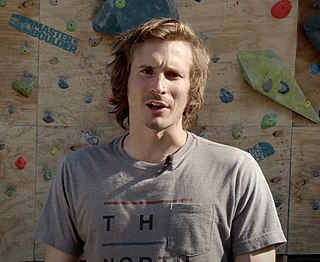
Daniel Woods is an American professional rock climber who specializes in bouldering and is considered one of the most important climbers in the history of bouldering. Woods has climbed over thirty bouldering problems graded 8C (V15) or harder, making him one of the most prolific climbers of hard boulder problems. He has also won several competitions, such as the U.S. National Bouldering Championship and some international competitions. In March 2021, Woods achieved the first ascent of a low start to Sleepwalker V16 (8C+). He named the problem Return of the Sleepwalker and proposed the grade 9A (V17), making him one of only three boulderers at the time to have climbed that grade.
Angela Payne is an American rock climber specializing in bouldering, who won a clean sweep of the 2003-2004 US American Bouldering Series, and who in 2010, became the first-ever female in history to climb an 8B (V13) boulder.

Alexandra Johnson is an American rock climber who has made numerous first female ascents, including Clear Blue Skies V12 (8A+) in Colorado, and Book of Nightmares V12 (8A+) and Lethal Design V12 (8A+) in Red Rocks. Her highest rated send, as of 2022, was “The Swarm” V14 (8B+) in Bishop. In 2009, she won the overall American Bouldering Series, and has twice won individual stages in the annual Bouldering World Cup series.
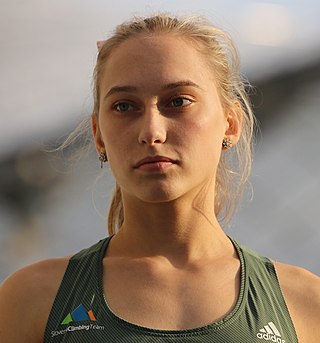
Janja Garnbret is a Slovenian rock climber and sport climber who has won multiple lead climbing and bouldering events at climbing competitions. In 2021, she became the first ever female Olympic gold medalist in sport climbing, and is widely regarded as one of the greatest competitive climbers of all time. She is also the world's first-ever female climber to onsight an 8c (5.14b) graded sport climbing route. As of the end of 2022, Garnbret had won the most IFSC gold medals of any competitive climber in history.
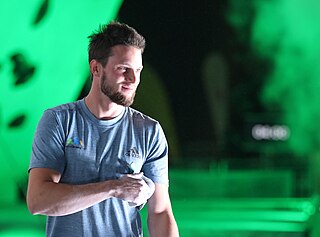
The 2018 season of the IFSC Climbing World Cup was the 20th season of the competition. Bouldering competitions were held at seven stops of the IFSC Climbing World Cup. The bouldering season began on April 13 at the World Cup in Meiringen, and concluded on 18 August with the World Cup in Munich. At each stop a qualifying was held on the first day of the competition, and the semi-final and final rounds are conducted on the second day of the competition. The winners were awarded trophies, and the best three finishers received medals. At the end of the season an overall ranking was determined based upon points, which athletes were awarded for finishing in the top 30 of each individual event. Jernej Kruder won the seasonal title in the men's competition and Miho Nonaka won the women's. Japan won the national team competition.
The 2019 season of the IFSC Climbing World Cup was the 21st season of the competition. Bouldering competitions were held at six stops of the IFSC Climbing World Cup. The bouldering season began on April 5 at the World Cup in Meiringen, and concluded on June 8 with the World Cup in Vail. At each stop a qualifying was held on the first day of the competition, and the semi-final and final rounds were conducted on the second day of the competition. The winners were awarded trophies, and the best three finishers received medals. At the end of the season an overall ranking was determined based upon points, which athletes were awarded for finishing in the top 30 of each individual event.












